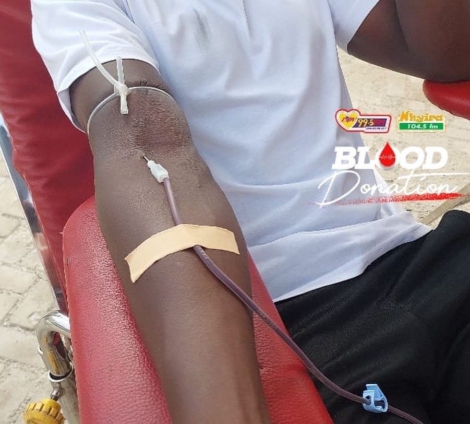A Medical Laboratory Scientist in Charge of the Blood Bank at the International Maritime Hospital (IMaH) in Tema, has urged Ghanaians to be honest when answering questions before they donate blood.
Ms. Doris Kusima Baiden explained that potential donors of blood were expected to answer a confidential questionnaire about their medical history before blood donation.
This is to give the health attendant a good idea of your general health and blood condition and foster a better service for donors and recipients.
Ms. Baiden was addressing issues related to blood donation at the weekly “Your Health! Our Collective Responsibility!" initiative by the Ghana News Agency aimed at promoting health-related communication and providing a platform for health information dissemination to influence personal health choices through improved health literacy
Ms. Baiden, supported by Mr. Robert Tetteh Djimajor, also a IMaH Medical Laboratory Scientist, explained that, as a routine before blood donation “we first take personal details like your name, age, date of birth, address, and other contacts. We then further proceed to ask confidential health questions.”
Ms. Baiden emphasised that donors were expected to come clean about medications taken in recent times, current health status, specific sexual activities, and other lifestyles.
“These questions are very confidential and help safeguard your own health and the health of the person receiving the blood. We only want to ensure that one is fully fit physically, mentally, and emotionally before donating blood,” she said.
She said that it is very important to be truthful because infections like HIV, Hepatitis B and C, and Syphilis could be transmitted by transfusion to a patient receiving blood.
She revealed that donating blood did not only benefit the receiver, but it also gave donors the chance to be offered a brief medical examination that included checking the temperature and pulse, blood pressure, ensuring minimum weight, and haemoglobin level.
“As a blood bank, it is our responsibility to ensure that all the blood coming in is safe for use and does not contribute to the loss of lives in the hospital. Saving lives is a collective responsibility, and all must endeavour to rightly go through the safe and secured procedures to donate blood,” she said.
Latest Stories
-
CAFCC: “Dreams need to score early to unsettle Zamalek” – Former Zamalek striker Felix Aboagye
21 mins -
GHS launches mobile app to counter misinformation about vaccines
32 mins -
Election 2024: Care Ghana warns EC of recruiting political actors as Returning Officers
40 mins -
Mohammed Kudus gets 5th Premier League assist as West Ham hold Liverpool
41 mins -
Religious support source of my success – Asantehene
47 mins -
Sierra Leone energy minister resigns over electricity crisis, as power returns to capital
55 mins -
EC accuses Bright Simons, IMANI Africa of peddling falsehood
1 hour -
GRA/SML contract: Akufo-Addo has whitewashed the KPMG report – Inusah Fuseini
1 hour -
USM Alger receive warm welcome at Oujda Airport ahead of game against RS Berkane
2 hours -
2023/24 Ghana Hockey League to kick-off this weekend
2 hours -
All payments received from our contract with GRA are performance-based, says SML
3 hours -
Marrakech 2024: Ghana’s Zinabu Issah wins gold in women’s discus throw
3 hours -
Our contract with GRA followed due process; ignore contrary reports – SML
3 hours -
SML is just Agyapa in suit and tie – Bright Simons
4 hours -
Domelevo condemns selection of KPMG to audit GRA/SML contract as illegal and unprofessional
4 hours

